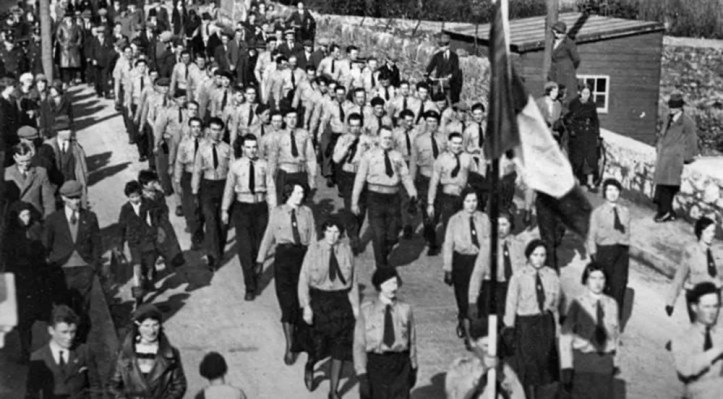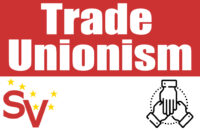The followinbg is by by Aodh MacManus, International Press Correspondence, Vol. 14, No. 11, 23 February 1934
“The size and spirit of the United Ireland party’s first annual convention are an encouraging portent.”
Thus the most candid of British imperialism’s organs in Ireland, the Irish Times (9 February 1934), comments in its editorial on the gathering of the fascist Blueshirts in Dublin on 2 and 3 February.
Over 1,000 delegates attended this Blueshirt convention: ranchers, big farmers, but with finance-capital’s avowed representatives in the background and the convention packed mainly by O’Duffy’s uniformed storm troops.
The masks came off at this convention, and fascism’s face protruded from all the principal speeches. Imperialism’s ideologues in Ireland clearly have burned the midnight oil in company with Mussolini and Hitler. Here is O’Duffy striking the dominant note:
“Already parliamentary democracy, even in countries where capitalism is not yet very noticeably on the decline, has shown itself unable to cope with the economic problems which are being thrust upon it by the very inability of capitalism to solve them in the old way.”
Saul among the prophets! This is not the Thirteenth Plenum speaking! O’Duffy continued:
“For example, in England there is a general consensus of opinion, even amongst conservatives, that parliament needs to be thoroughly overhauled. There is no reason why we should make an idol of parliament.”
With a clarity that revealed how usefully the mentors of this braggart had prepared his speech, O’Duffy outlined the Blueshirt policy: (1) the tying of Ireland to the British Empire; (2) the destruction of the working-class movement; (3) the erection of Mussolini’s Corporate State façade as a cover for finance-capital’s terror dictatorship.
The United Ireland party, he said, will secure such “an agreement with the British government as will enable the Irish farmer again to enter the British market unhampered by quotas and restrictions.” This would maintain Ireland as an agrarian hinterland and war base for England.
“The terms ‘grazier’ and ‘rancher’ have been held up to opprobrium. They have been referred to as representing a class whose existence and occupation is undesirable. My purpose is to show that stock-raising is undertaken because of its suitability both from the production point of view and because of the Free State’s proximity to a market which is at once remunerative and easily reached.”
The policy of imperialism’s mercenaries towards the working-class movement was advanced in the orthodox fascist fashion. The young Communist Party of Ireland, like the head of the ‘royal martyr’ that found its way into all Mr. Dick’s memorials, featured prominently and luridly in the majority of the speeches. Professor Hogan, for instance, complained that Sean Murray, the leader of the Communist Party that was calling repeatedly for united mass action against the Blueshirts, was a free man, while he, a respectable Christian citizen, was being raided by detectives.
About the fascist policy towards the Communist Party there was no shilly-shallying: it must be stamped out, root and branch. But the economic organisations of the workers will be destroyed through the medium of the Corporate State. Said O’Duffy:
“Every employee will be a member of a union; every farmer or manufacturer will be a member of an employers’ association.
“In every industry the men’s union and the employers’ association will be closely combined in a federation of which the two bodies will be merely two wings or branches. This federation of employers and employees, acting through its permanent joint council and under the supervision of the National Economic Council and of the appropriate Minister of State, will be given statutory powers to make agreements in regard to the industry which it represents.
“Those agreements will be binding on all workmen and on all employers…
“Wage agreements made by a corporation or sub-corporation will be binding on all the members of the body making it, and disputes which cannot be settled by agreement will be determined by an industrial court; so that strikes and lock-outs, which cause so much waste and suffering, will altogether cease.”
The workers’ trade unions, therefore, built up by so much sacrifice, are to be replaced by the sham unions of Mussolini and Hitler. It will also be illegal to take strike action; the workers are to have their chief economic weapon taken from them.
That the masses were not deceived by O’Duffy’s demagogy about a “truly Christian social programme” that “must avoid the pitfalls of Communism on the left and capitalism on the right,” was shown by the events immediately following the fascist convention. The Blueshirts held a parade and meeting in Dundalk and Drogheda (both quite close to each other) on 10 February. For two days, both towns were in turmoil, despite all the efforts of the police and troops to protect the O’Duffy Blueshirts.
In Drogheda, the hatred of the masses—men and women—rose to such heights that all the trappings of war were called upon to save the Blueshirts. De Valera’s organ, the Irish Press (12 February 1934), thus describes the scenes:
“Despite repeated baton charges, in which many people were injured, the Garda (police) were unable to restore order. Eventually, after detectives had fired shots over the heads of the crowd without effect, military, who had been drafted into the town, put on gas masks and hurled tear-gas bombs to disperse the crowd. It is also reported that soldiers used their bayonets later in the day.”
Despite the batons, shots, tear-gas, and bayonet charges, the workers still fought back, meeting the troops with cries of “Murderers!” and “Green and Tans!”
Significant also was the anti-fascist meeting at Dundalk, addressed by the chairman of the Trades Council, while the Tralee branch of the Irish Transport Workers’ Union has passed a resolution calling on the workers to resist a fascist dictatorship. These developments, coupled with the big meeting held in Dublin by the Labour League Against Fascism, reveal a growing realisation on the part of the Irish working masses of the necessity for organised anti-fascist activity.
The task now of the Communist Party of Ireland and the Labour League Against Fascism is to overcome the opposition of the Labour reformists and Republican leaders to this united front, and to drive the anti-fascist front into the trade union branches and to all the main provincial areas.






